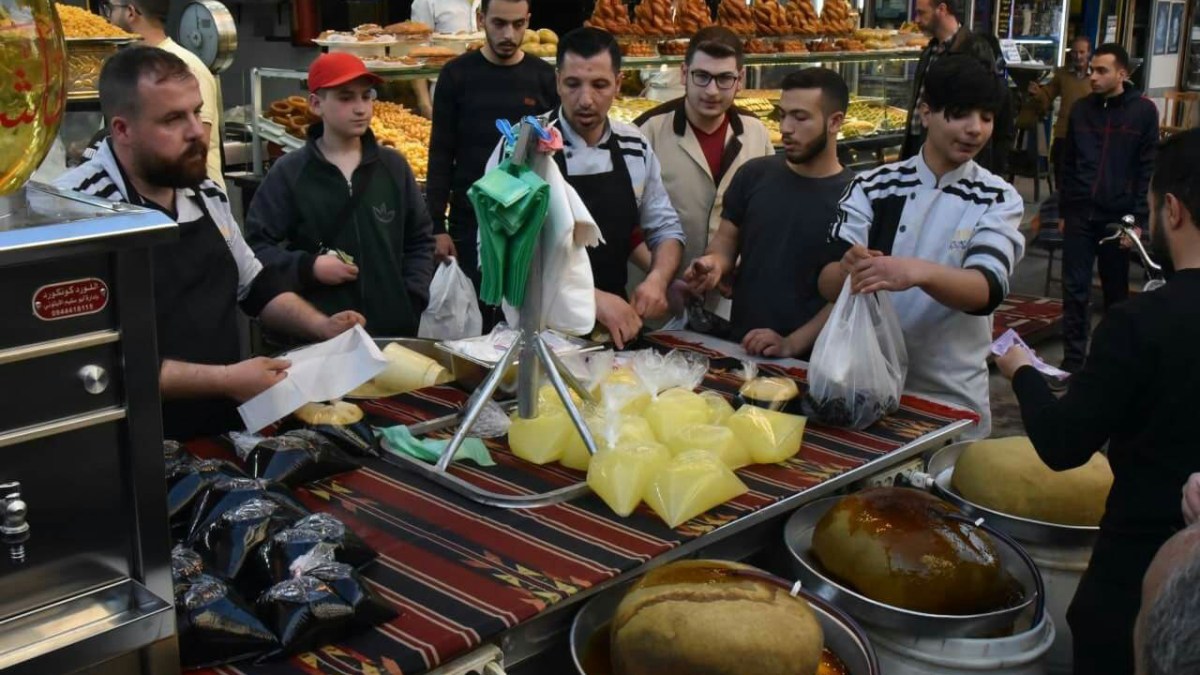DAMASCUS – Several organizations and charities are active in regime-controlled areas during the holy month of Ramadan, with the aim of providing support and aid such as food, clothes and meals to the poorest and neediest segments.
With the worsening living crisis and the massive rise in prices compared to last year, the number of initiatives launched by organizations in Ramadan this year appears to be significantly lower than in previous years.
Rami (25 years old) – one of the coordinators of Ramadan initiatives in the association "Syria Btjmna" – says to Al Jazeera Net about not launching the initiative this year, "We did not launch our Ramadan initiative this year for several reasons, most notably the repercussions of the earthquake that accompanied the advent of the holy month, which made support directed to those affected by the earthquake, in addition to the absence of support by some donors who preferred to provide aid to those affected before the beginning of the Ramadan."
Other associations and organizations were able to launch Ramadan initiatives this year in a number of governorates through initiatives through which they set up Iftar tables for fasting people and distributed Ramadan baskets (food and drinks) to them.
Volunteers working in a kitchen belonging to Saaed Charity Association (social media)
Meals, clothes and baby milk
Saaed Charity Association launched its Ramadan campaign "Saaed Kitchen" in 3 governorates: Damascus, Aleppo and Tartous, and the number of meals it announced for distribution in Damascus governorate and its countryside only about a thousand Iftar meals per day.
The association was able to organize a fundraising campaign in the North Rhine district in Germany, through which Syrians and Lebanese immigrants donated food, baby milk and clothes transported by 5 convoys as aid to those affected by the earthquake in Ramadan.
Says Lamia (30 years) – a volunteer in the Association Saaed – to Al Jazeera Net "We launched a campaign to collect donations for those affected by the earthquake in Ramadan, and we were able – thank God – to collect 5 convoys of aid, thanks to the participation of many migrants who were sympathetic to those affected by the earthquake and others due to the high cost of living."
Ramadan Iftar meals from a kitchen belonging to Noor Al-Ghad Association (Social Media)
The volunteer in the Saaed Association pointed out that the initiative was able to reach segments of the "destitute" and those coming to Damascus after the earthquake, and distributed to them baskets containing foodstuffs that included oil, rice, lentils and canned food, and for those affected by the earthquake in particular, aid was distributed - in addition to food - including clothes, baby formula, diapers and detergents.
Syrians in regime-controlled areas have recently been suffering from a crisis of infant formula that has led to a doubling of its prices and the interruption of certain types in various areas.
In addition to helping the "Nour Al-Ghad Charitable Association for the Care of People with Disabilities" distribute Iftar meals to fasting people, the association continues to provide various meals of ready-made dishes such as kabsa, peas, grape leaves and mahashi, to dozens of families daily in Damascus and its countryside.
For its part, the Ministry of Awqaf in the regime government launched the "Iftar Fasting Project" initiative, through which it provided a number of Iftar meals "rich in meat and chicken", which were distributed to the poorest segments as well as orphans and earthquake victims.
Coinciding with the launch of its initiative, the ministry called on traders to reduce their profits or sell without profits during the holy month due to poor economic conditions.
"With a share propped up a jar"
These initiatives, and the food, clothes and needs of children they provide, are a supporting factor for large segments of Syrians to spend their fasts, amid the high cost of living and the rapid collapse of the exchange rate of the pound against the dollar, which exceeded the barrier of 7500,<> pounds, and the consequent rise in the prices of various food and consumer goods.
The prices of most goods in regime-controlled areas during the holy month of Ramadan witnessed an unprecedented rise, and a report by the local newspaper Qasioun indicated that the average cost of living of a Syrian family at the beginning of Ramadan amounted to about 5.6 million pounds per month (about $ 746), while the average salaries in the public and private sectors in regime-controlled areas are about 150,20 pounds ($ 2019) since <>.
And the role of Ramadan baskets in supporting the needy, says Majd (42 years) – one of the beneficiaries of the initiatives – to Al Jazeera Net "aid Kalbsa that supports a jar as they say, we have been developing plans and calculate accounts a thousand times before we buy a liter of oil, or an ounce of meat to prepare a meal support our bodies."
"The basket I received contained oil, rice, tea, sugar, lentils, mortadella and other goods that cost 200,26 ($<>) in the market, which is the value of my salary," he said.
A statement by the World Food Programme (WFP) in early February indicated that 70% of Syrians may not be able to provide food for their families in the foreseeable future, and that 2.9 million Syrians are at risk of sliding into hunger.

